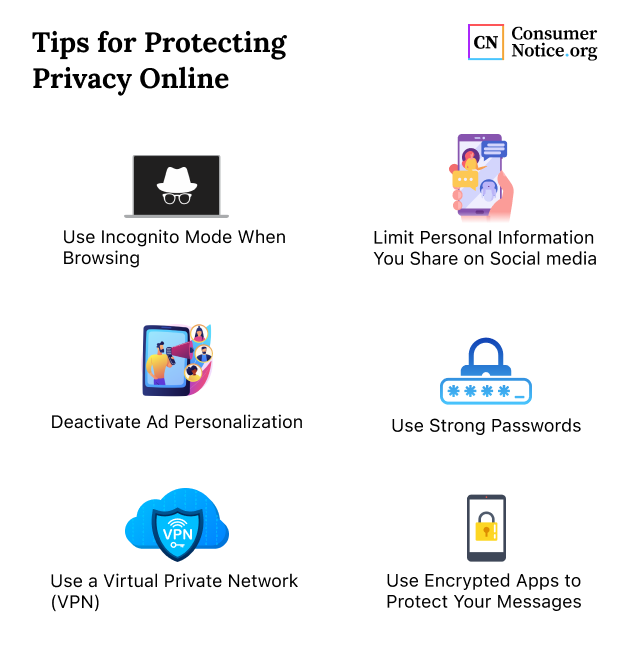Imagine browsing the internet without a second thought, feeling confident that your personal information is secure. The online world offers endless possibilities, but it also poses risks to your privacy.
As an American, safeguarding your digital life is more crucial than ever. How do you ensure your private details remain just that—private? This guide is your ticket to peace of mind, providing essential online privacy tips tailored just for you.
Discover how easy it is to protect yourself and stay one step ahead of potential threats. Dive in, and unlock the secrets to a safer online experience today!
Importance Of Online Privacy
Protecting online privacyis important for everyone. It keeps personal data safe. Personal data includes your name, address, and phone number. Without protection, strangers might access this data. They might use it for bad reasons. This could hurt you or your family. Online privacy helps avoid these risks.
Ignoring privacy can lead to identity theft. Thieves can pretend to be you. They might steal your money. Or they might use your credit cards. This can cause big problems. It can take a long time to fix. Being careful online helps keep your identity safe.
Use strong passwords for all accounts. Change them often. Avoid using the same password everywhere. Be careful with what you share online. Some things should stay private. Always check privacy settings on social media. Make sure only friends see your information.

Common Privacy Threats
Data breacheshappen often. Many people lose their personal information. Hackers steal this data from websites. It can be very dangerous. Your name, address, and credit card info are at risk. Always use strong passwords. Protect your accounts from hackers.
Identity theftis scary. Someone pretends to be you. They use your information. They might open bank accounts in your name. This can ruin your credit score. Check your bank statements regularly. Report anything strange right away.
Phishing scamstrick people. Fake emails look real. They ask for your personal info. Never click on strange links. Always check the sender’s email address. Stay alert and protect your data.
Secure Your Devices
Keep your device software updated. Updates fix security holes. They protect against new threats. Set updates to happen automatically. This means you won’t forget. Your device stays safe and sound. Always check for updates regularly.
Use strong passwords. They should be hard to guess. Mix letters, numbers, and symbols. Make them at least eight characters long. Don’t use easy words or names. Each account should have a different password. This makes it harder for hackers.
Two-factor authentication adds an extra layer of safety. It needs more than just a password. You might need a code from your phone. This makes it harder for hackers. They can’t get in without your phone. Always enable two-factor on important accounts.
Safe Browsing Practices
Private browsing mode helps keep your online activity hidden. It doesn’t save your search history or cookies. This means other users can’t see what you’ve searched. It’s great for shared computers. Always choose this mode in public places.
Cookies store website data on your computer. They help websites remember you. But too many can slow your browser. Clear them regularly for better performance. Most browsers have a simple option to clear cookies. Look for it in the settings.
Extensions add features to browsers. Some can be useful. Others might track your activity. Always check permissions before adding new ones. Remove any that you don’t use. This keeps your browser fast and secure.
Social Media Privacy
Change settings to keep your information safe. Limit who can see your posts. Make profiles private. Choose what friends can see. Look at settings often. Apps change settings without telling you.
Sharing too much can be risky. Think before posting. Personal details should stay private. Protect your location and plans. Some strangers might use your info. Keep family and friends safe. Share less, stay safer.
Block people you don’t know. Stop them from seeing your profile. Report bad behavior quickly. Social media has tools for this. Use them to protect yourself. Keep your online space calm and friendly.
Email Security
Spam often looks real. Check for odd words. Check sender’s address. If it’s unknown, be careful. Never open strange attachments. They can harm your computer. Many spam emails ask for money. Be alert. They use tricks to get personal info.
Encrypting keeps emails safe. It hides content from strangers. Use tools like PGP or S/MIME. These tools make emails secret. Encryption is important for privacy. It protects your data. Learn how to encrypt. Practice often.
Suspicious links are dangerous. They can lead to bad sites. Always double-check links. Look for strange names. Never click unknown links. They can steal your information. Hover over a link to see its real address. Be careful and stay safe.
Using Vpns
VPNs help Americans protect their online privacy by hiding their IP addresses. They secure internet connections and guard personal data from hackers. Using a VPN adds an extra layer of security to online activities.
Benefits Of Vpns
VPNs keep your online activities private. They hide your real location. Your data stays safe from hackers. Websites can’t track you easily. VPNs help protect your personal information. They are useful for accessing blocked websites. Streaming videos is smootherwith VPNs. They make you feel safer online. Many people trust VPNs for privacy. They are very popular for a good reason.
Choosing The Right Vpn
Pick a VPN that is easy to use. Check if it has strong security features. Read reviews from other users. Look for a VPN with good customer support. Make sure it works on your devices. Some VPNs offer free trials. This helps you test before buying. Choose a VPN with a fast connection. A good VPN keeps your data safe. It should also be affordable.
Protecting Personal Information
Keep personal info private. Share only with trusted people. Use privacy settings on social media. Avoid sharing sensitive data online. Read terms before agreeing. Companies collect data for ads. Limit what they know about you. Disable location tracking on apps. Turn off unnecessary permissions. Choose apps carefully. Delete unused apps. Regularly review privacy settings. Keep software updated. Use strong passwords. Don’t reuse passwords. Enable two-factor authentication. Protect your digital life.
Check your credit report often. Look for mistakes. Report them quickly. Errors can affect your score. Free reports are available annually. Use trusted websites for reports. Watch for unknown accounts. Identity theft is a risk. Monitor for unusual activity. Alert authorities if needed. Protect your financial health. Use credit monitoring services. They send alerts for changes. Stay informed about your credit. Take steps to secure your information.
Privacy Tools And Apps
Ad blockers help keep your online space clean. They stop annoying ads. Fewer ads mean fewer trackers. Privacy is improved. Ads can slow down your browser. Ad blockers make it faster. Some popular ad blockers are uBlock Origin and Adblock Plus. They are easy to install. Safe browsing is possible with these tools.
Browsers like Brave and Firefox focus on your privacy. They block trackers automatically. This keeps your data safe. No need to worry about online spying. These browsers are free. They are easy to download. They protect your information and make browsing secure.
Messaging apps like Signal and Telegram keep chats private. They use encryption for messages. Only you and your friend can read them. Encryption makes it hard for hackers. These apps are free. They are easy to use. Feel safe when you chat.
Staying Informed On Privacy Issues
Reading privacy newshelps you stay safe online. News websites often report new threats. These threats could harm your data. They also tell about new laws. These laws protect your online privacy. Following trusted news sources is key. Always check if the source is reliable. Reliable sources give accurate information. Many websites offer news alerts. Sign up for these alerts. They send updates to your email. This way, you stay informed about privacy issues.
Privacy policies explain how companies use your data. Reading them carefully is important. They tell what information is collected. Also, how that information is stored and shared. Some policies are hard to understand. Look for simple explanations online. Websites often have privacy settings. Adjust these settings to keep your data safe. Many apps have privacy options too. Change these settings to protect your information. Always know how your data is being used. This knowledge helps keep your privacy secure.
Frequently Asked Questions
What Are The Best Ways To Protect Your Privacy Online?
Use strong passwords and enable two-factor authentication. Keep software updated to avoid vulnerabilities. Use a VPN to encrypt your internet connection. Regularly check privacy settings on social media. Be cautious with personal information shared online.
What Are Those Five-five Tips To Stay Safe Online?
Use strong passwords and update them regularly. Enable two-factor authentication for added security. Keep software and antivirus up to date. Be cautious of phishing emails and suspicious links. Protect personal information by sharing it sparingly online.
What Rights Do Americans Have To Privacy And Online Activity?
Americans have privacy rights under the Fourth Amendment, protecting against unreasonable searches. Online privacy is governed by laws like the Electronic Communications Privacy Act. Companies must follow privacy policies, and users should be aware of terms of service. Always use strong passwords and enable two-factor authentication for better security.
Do Americans Care About Data Privacy?
Americans show increasing concern about data privacy. Many prioritize protecting personal information online. Privacy regulations like GDPR influence awareness. Companies face pressure to enhance security measures. Users demand transparency in data handling practices. Public interest in data privacy continues to grow, reflecting heightened awareness and action to safeguard personal information.
Conclusion
Protecting your online privacy is crucial today. Simple steps can make a big difference. Use strong passwords and change them often. Be cautious with personal information online. Check privacy settings on social media. Avoid using public Wi-Fi for sensitive tasks.
Consider using VPNs for added security. Stay informed about new privacy threats. Educate yourself and others. Your online safety matters. Implement these tips and guard your digital life. Stay safe, stay private.
Read More:
- Best Antivirus Software for Windows 2025: Ultimate Guide
- Metaverse Investment Opportunities USA: Unlocking Future Wealth
- Best Vpn for Usa Streaming Services: Unblock & Enjoy!
- Iphone 16 Pro Max Full Review: Ultimate Guide Unveiled
- Smart Locks With Fingerprint Recognition: Secure Your Home
- Ultra-Thin Laptops With Long Battery Life: Sleek & Powerful
- Ai-Powered Personal Finance Apps: Revolutionize Budgeting
- Cloud Storage Services for Professionals: Maximize Efficiency

